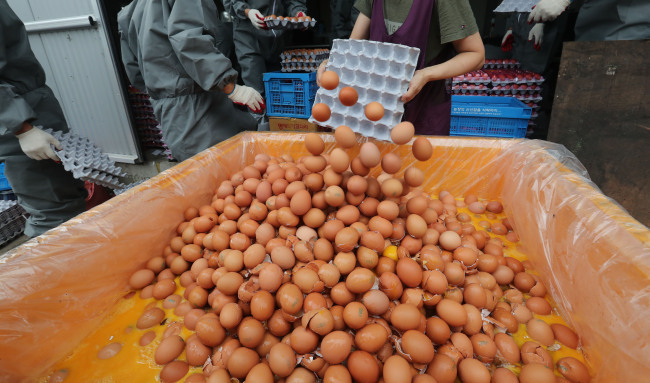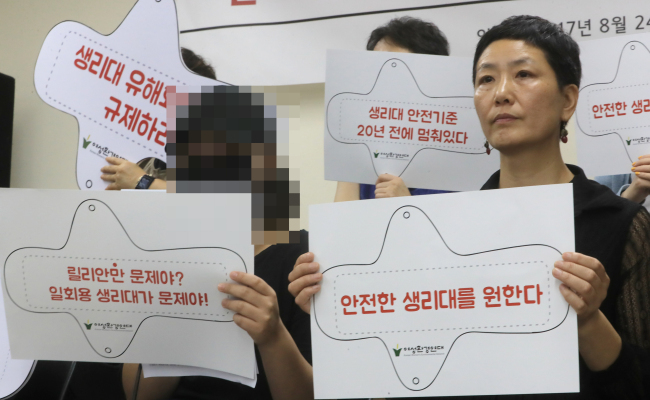[Safer Korea] 2018 begins with moves to strengthen consumer safety
By Won Ho-jungPublished : Jan. 1, 2018 - 14:49
As the dust settles on a year riddled with back-to-back controversies involving the safety of everyday products such as eggs and sanitary pads, the South Korean government has announced a series of measures to begin 2018 with a more regulated and safe consumer market.
In 2017, consumers and manufacturers alike underwent a series of crises as revelations of toxins being included in common household goods continued to surface.
The biggest shock came in August, when it was discovered that eggs being sold in Korea showed potentially toxic traces of the pesticide fipronil and insecticide bifenthrin.
In 2017, consumers and manufacturers alike underwent a series of crises as revelations of toxins being included in common household goods continued to surface.
The biggest shock came in August, when it was discovered that eggs being sold in Korea showed potentially toxic traces of the pesticide fipronil and insecticide bifenthrin.

The Agriculture Ministry began a comprehensive investigation testing 1,659 egg farms all over the country in mid-August, which concluded that 52 farms had sold eggs that fell short of safety regulations.
The Agriculture Ministry and the Ministry of Food and Drug Safety have put forward a series of policy changes to prevent another crisis including creating a new industry specifically for screening and packaging eggs for consumption.
On Dec. 28, the government also announced that eggs will be stamped with codes indicating their date of production and the environment in which the hens are kept.
However, it is unclear whether these measures will bring peace to consumers who have become hypersensitive about safety issues since the humidifier sanitizer crisis, which linked sanitizing products from RB Korea (formerly Oxy Reckitt-Benckiser) with over a hundred deaths.
“Consumers in Korea are looking for products that offer the most value for price, but in the case of important consumer goods they are willing to pay more for premium products, and that includes products that are safe,” said an official with the Korea National Council of Consumer Organizations.
“Instead of assuming that consumers want low prices over all else, companies should focus on providing the most essential information regarding product safety.”
The willingness of consumers to pay more for safety was demonstrated in the fall, when a previous study indicating that traces of toxins were found in leading brands of sanitary products for women went public. The brands in the study included those that made up nearly all of the Korean market share, and consumers turned to buying organic products from overseas out of mistrust.
The Korean government also ran its own study of major brands in Korea, and concluded last week that all sanitary pads were safe to use. The Drug and Food Safety Ministry also announced that beginning next October, sanitary pads will be required to list all of the materials used in making the products on their packaging.

“We already list all of the materials used in our sanitary pads on our website for consumers‘ convenience,” said an official with Yuhan-Kimberly, which makes the leading brands White and Good Feel here. “We understand that simply listing all the materials may be confusing for consumers, and we are eager to take every opportunity to provide objective information on our products.”
One of the main criticisms levied on the government by consumer groups following these retroactive measures is the frequent absence of set guidelines regarding safe levels of toxins in various products which lead to belated studies, such as the one on sanitary pads this year.
The Food and Drug Safety Ministry is also conducting a study on the health risks of heat-not-burn tobacco products such as IQOS from Philip Morris International, which have been on the market since April. The results are expected this year.
Over 60,000 packs of heat-not-burn tobacco sticks, which manufacturers claim are potentially less dangerous than combustible cigarettes, were sold in the first month alone, leading to concerns that a health study now may be too late to protect consumers.
Following a series of safety issues related to daily consumer goods, fundamental debate has also been rekindled, whether to introduce class-action suits and punitive damages for consumers.
Consumer groups contend that punitive damages will help curb the development of potentially dangerous products even without government intervention.
“This is why we’re pushing for the government to allow class-action suits for consumers across all product categories,” said the KNCCO official. “We are seeing similar safety issues repeat themselves because the repercussions are weak. This is one way for consumers to protect themselves.”
However, consumer groups also do recognize that Korean consumers must become savvier in their shopping. According to the Korea Consumer Agency, which runs a hotline for consumer complaints, calls regarding product safety remained nearly unchanged between 2016 and 2017 despite continued safety crises -- with 1,062 calls about safety in November 2016 and 1,199 in the same month this year.
“Consumers must recognize that they have rights, but they also have responsibilities. As policies change to provide more information to consumers, shoppers must educate themselves as well,” the official said.
By Won Ho-jung (hjwon@heraldcorp.com)




![[Herald Interview] 'Amid aging population, Korea to invite more young professionals from overseas'](http://res.heraldm.com/phpwas/restmb_idxmake.php?idx=644&simg=/content/image/2024/04/24/20240424050844_0.jpg&u=20240424200058)












![[KH Explains] Korean shipbuilding stocks rally: Real growth or bubble?](http://res.heraldm.com/phpwas/restmb_idxmake.php?idx=652&simg=/content/image/2024/04/25/20240425050656_0.jpg&u=)

